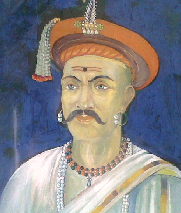16 November 1713
Balaji Vishwanath appointed the Peshwa of the Maratha Empire.
What happened?

On 16 November 1713, Maratha Emperor Shahu appointed Balaji Vishwanath as the Peshwa or Prime Minister of the Empire.
Balaji Vishwanath Biography
Read on about Balaji Vishwanath, an eminent Peshwa who did yeoman service to the Maratha Empire. Reading his biography will reveal wonderful details of modern Indian history, which will surely help in IAS preparation.
- Balaji Vishwanath was the 6th Peshwa and the first in a series of hereditary Peshwas of the Maratha Empire.
- For his exemplary service to Chhatrapati Shahu in consolidating an empire and setting right many things in the kingdom, he is called the ‘Second founder of the Maratha State’.
- Balaji was born on 1 January 1662 in Shrivardhan in the present Raigad district in Maharashtra.
- His father was Vishwanathpant Bhatt and the family were the hereditary Deshmukhs of Shrivardhan.
- Balaji entered the Maratha administration and served as an accountant for a Maratha general Dhanaji Jadhav. He then worked as the sarsubedar at Pune and Daulatabad.
- As an administrator under Jadhav, Balaji was sent to check the credentials of Shahu (son of Sambhaji) who had been released by the Mughals from captivity after the death of Aurangzeb. Balaji influenced his master Dhanaji Jadhav to support Shahu as the rightful claimant to the Maratha throne.
- After this, in a brief battle between Shahu and his aunt Tarabai who was vying for supremacy at the Maratha throne, Balaji Vishwanath helped Shahu raise an army for his defence. He also helped Shahu defeat Tarabai at Kolhapur and install another cousin of Shahu, Sambhaji II on the throne of Kolhapur. This brought the house of Kolhapur under Shahu’s subordination.
- After this, Shahu subdued the Angres for which he resorted to Balaji’s help. Balaji used clever negotiation rather than direct combat and won many victories. He was skilled in administration and court politics. He was raised to the position of Peshwa by Shahu for his services on 16 November 1713.
- With Balaji’s help, Emperor Shahu was able to consolidate the Maratha Empire and brought many disputing factions under him. Balaji was able to appeal to the Maratha pride and sought to establish a strong, unified entity.
- Balaji was also a master in finance. He successfully negotiated a treaty with the Mughal governor of the Deccan, Husain Ali in 1718 through which the Maratha state received the Chauth (1/4th of revenues) and the sardeshmukhi (additional 10% revenues) of the Deccan Mughal provinces. The Mughal Emperor Farrukhsiyar did not accept this treaty. Husain Ali then dethroned Farrukhsiyar with Maratha help. With increased clout in the Mughal court, Balaji was now able to secure the release of Shahu’s mother, wife and half-brother from Mughal captivity.
- Balaji started the system of Jagirdari to appease the Maratha Sardars. He also created a cooperative commission of all Sardars and made Shahu the Chhatrapati of the commission. It was during his time that the Peshwa assumed utmost importance with the Chhatrapati becoming a nominal ruler only.
- He also made many financial reforms in the state. Apart from that, he made the title of the Peshwa hereditary.
- He is remembered most for his bringing peace and stability into the Maratha Empire by treaties and battles, and also for creating the foundations of a strong state that would succeed the Mughal Empire as the strongest kingdom in the subcontinent.
- Balaji Vishwanath died of ill-health on 12 April 1720. His son Baji Rao I succeeded him as the Peshwa.
Also on This Day
1877: Death of Ardaseer Cursetjee Wadia, shipbuilder and engineer, and the first Indian to be elected as a Fellow of the Royal Society. 1945: UNESCO established. 1986: The second SAARC summit held in Bangalore. 1988: India gave full recognition to the state of Palestine.
See previous ‘This Day in History’ here.
Also, see:
| Chhatrapati Shivaji Maharaj |
| Sambhaji |
| UNESCO |

Comments